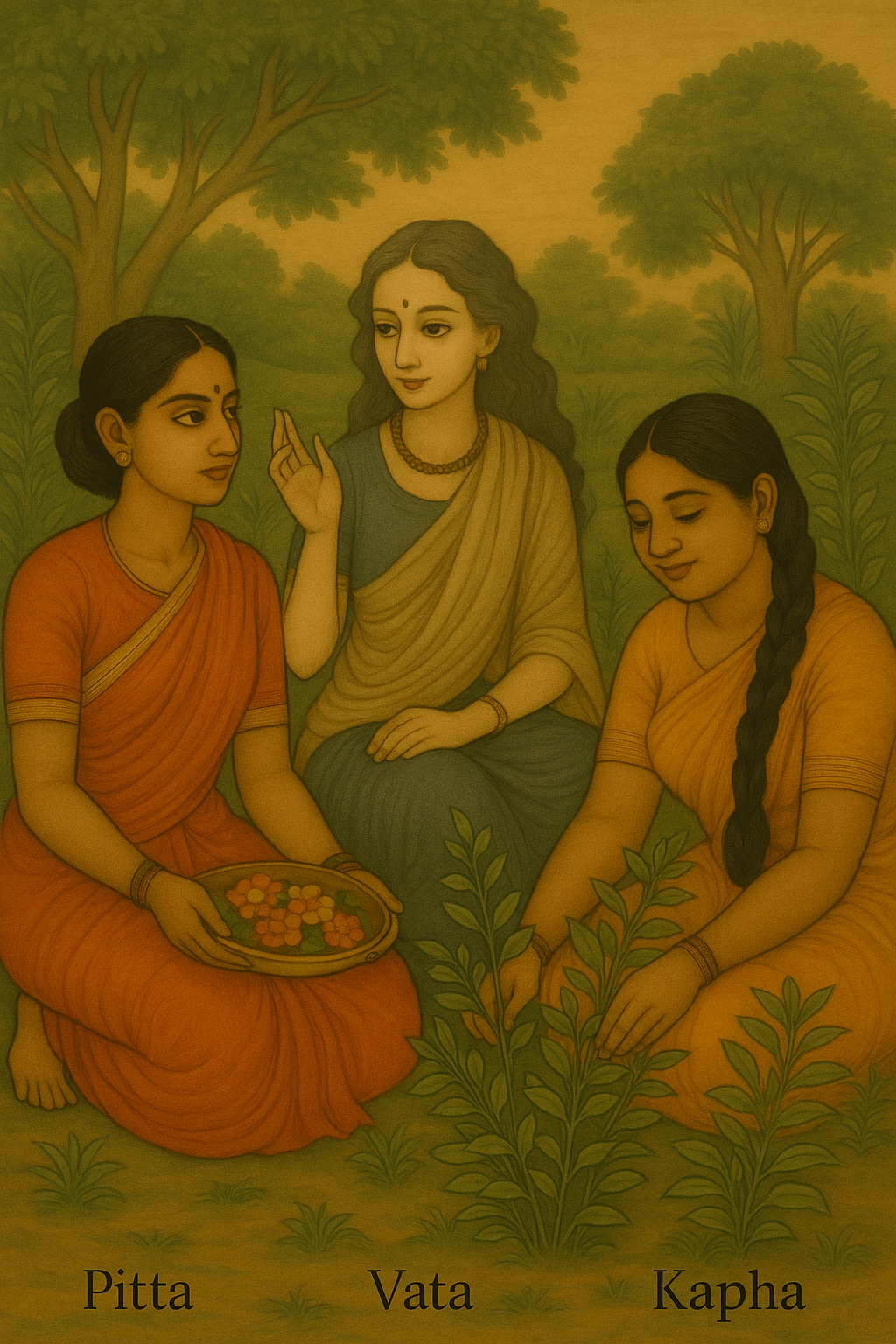
Spring Dinacharya: Step-by-Step Guide for the Doshas
Dinacharya means “to follow the rhythm of the day.” In Ayurveda, daily rituals bring us into harmony with the cycles of nature and the cosmos. In spring, when Kapha dosha predominates, each constitution (Vata, Pitta, and Kapha) benefits from tailored practices to restore balance, awaken vitality, and prevent seasonal imbalance.
Vata Dosha
Dear Vata,
You are the breath of fresh air, the spark of creativity, the joy of movement and possibility. Your nature is light, dry, cool, quick, and ever-changing — like the wind itself. When balanced, you are imaginative, enthusiastic, full of life, and able to adapt to whatever comes your way. You bring inspiration to others through your creativity and vision.
Yet when Vata becomes disturbed, your airy qualities can scatter your energy. You may feel anxious, restless, and unable to find stillness. Your digestion may become irregular, your skin and joints may feel dry, and your sleep may be disturbed. Emotionally, you may drift into worry or fear.
Spring’s moist and heavy qualities usually bring some comfort to you, grounding your airiness. But cold, windy mornings or irregular routines can still disturb your balance, leading to bloating, dryness, or heightened nervousness.
Your Step-by-Step Flow:
-
Wake gently with the sunrise (not before 6am) to preserve energy.
-
Short Puja: Light a candle or incense, offer gratitude, and chant a mantra such as Om Suryaya Namaha. This anchors your mind in stillness.
-
Meditation: Guided visualisation or mantra repetition to steady wandering thoughts.
-
Breathwork: Nadi Shodhana (alternate nostril breathing) for 5 minutes to calm and centre.
-
Movement: Gentle yoga, tai chi, or slow walking to keep you grounded.
-
Sun gazing: Allow the soft rays of the rising sun to warm your skin, regulating your rhythm and calming your nerves.
-
Tongue scraping: Clear away toxins and awaken digestion. Removes ama, stimulate the internal organs, activates the srotas and improves taste sensation. Tongue scrapers
-
Oil pulling: Swish warm Bioveda Gum and Mouth oil to moisten dryness and steady the nervous system, improve the oral microbiome, strengthen the gums, remove bacteria and detoxifies.
-
Abhyanga: Massage with warm BioVeda black sesame, Vata oil or Dhanvantri oil to ground, calm, and nourish tissues. Dhavnvantri oil is especially helpful for supporting sleep when Vata is too elevated.
-
Warm water with lemon: Hydrates and soothes digestion. A warm class of water with Dashamoola and honey can also be very beneficial for settling a rattled nervous system. Ashwagandha (Withania) is recommended if a Vata personal is waking in the morning with anxiety and stress and can also be used before bed for sleep.
-
Breakfast: Warm, nourishing meals — porridge with cinnamon, stewed fruits, spiced grains. Avoid cold, raw, or dry foods.
Pitta Dosha
Dear Pitta,
You are the fire in the belly, the radiance of the midday sun, the clarity of intellect and determination. Your nature is hot, sharp, oily, and penetrating. When balanced, you are intelligent, focused, courageous, and a natural leader who inspires others with your strength and precision.
Yet when Pitta grows too strong, the fire within can burn too brightly. Irritability, impatience, criticism, or competitiveness may dominate your mind. Physically, you may experience inflammation, skin eruptions, acid reflux, or heat-related issues. Emotionally, anger or frustration can cloud your natural brilliance.
Spring’s dampness can feel heavy on your fiery nature, aggravating digestion and skin. As the days grow warmer, heat accumulates in your body, making you more prone to irritability and inflammation if balance is not maintained.
Your Step-by-Step Flow:
-
Wake just before sunrise, allowing a calm and gentle start. Never jump into work, checking social media or emails as when you wake. It is crucial that you push these tasks aside until later in the day.
-
Short Puja: Offer flowers or light incense, chant Om Shanti Shanti Shanti to invite peace, and bow to the rising sun.
-
Meditation: Loving-kindness (Metta) meditation to soften intensity and cultivate compassion.
-
Breathwork: Cooling pranayama such as Sheetali or Sheetkari for 5 minutes to reduce inner heat.
-
Movement: Gentle yoga, swimming, or a walk in the cool morning air — avoid intense exercise in heat.
-
Sun gazing: Briefly connect with the early rays of the sun or at sunset, balancing your fire without overheating.
-
Tongue scraping: Clears excess heat and refreshes digestion. Removes ama, stimulate the internal organs, activates the srotas and improves taste sensation. Tongue scrapers
-
Oil pulling: Swish warm Bioveda Gum and Mouth oil to moisten dryness and steady the nervous system, improve the oral microbiome, strengthen the gums, remove bacteria and detoxifies.
-
Abhyanga: Massage with our BioVeda cooling Pitta oil, Chandanadi oil or Bala Ashwagandha Oil to cool the body and calm the mind.
-
Warm water with lemon: Supports gentle detoxification and lightens the system. Pitta may also benefit from a small glass of warm water with Manjista root powder, Shatavari powder or Brahmi powder.
-
Breakfast: Cooling, light foods — basmati rice porridge, sweet fruits, or coriander-mint dishes. Avoid hot spices, sour foods, and fermented foods.
Kapha Dosha

Dear Kapha,
You are the earth itself — steady, nurturing, and full of strength. Your nature is heavy, slow, cool, moist, and stable. When balanced, you are loving, dependable, patient, and deeply caring. You provide stability and endurance, grounding those around you like fertile soil.
Yet when Kapha accumulates, your earthiness can turn to mud. Sluggishness, lethargy, congestion, and excess weight may appear. Emotionally, you may feel stuck, resistant to change, or pulled into sadness and attachment.
Spring is your season, and also your greatest challenge. As snow melts into water and earth becomes damp, Kapha qualities build within you. Mucus congestion, dull digestion, tiredness, and heaviness can easily surface if not balanced with lightness and stimulation.
Your Step-by-Step Flow:
-
Wake early, before 6am, to prevent heaviness from deepening.
-
Short Puja: Light a lamp, clap your hands or ring a bell, and chant an energising mantra such as Om Ram Ramaya Namaha. This lifts your spirit and awakens energy.
-
Meditation: Breath-focused mindfulness or gratitude meditation to uplift and lighten.
-
Breathwork: Stimulating pranayama like Kapalabhati or Bhastrika to energise and clear congestion.
-
Movement: Vigorous daily activity — running, dancing, power yoga — to create sweat and burn stagnation.
-
Sun gazing: Stand in the rising sun to awaken prana, clear heaviness, and stimulate digestion.
-
Tongue scraping: Removes thick coating, removes ama, stimulate the internal organs, activates the srotas, clears mucus, and sharpens the senses (especially taste) Tongue scrapers
-
Oil pulling: Swish warm Bioveda Gum and Mouth oil to moisten dryness and steady the nervous system, improve the oral microbiome, strengthen the gums, remove bacteria and detoxifies.
-
Abhyanga: Brisk massage with BioVeda Kapha oil, Sahacharadi Oil or Maha Narayan oil to stimulate circulation and break stagnation.
-
Warm water with lemon: Kicks sluggish digestion into gear and reduces excess mucus. Kapha also benefits from a small glass of warm water with Tulsi powder, Haritaki or Triphala powder.
-
Breakfast: Keep it light and spicy — steamed greens, lentil soups, millet porridge with ginger, or herbal teas. Avoid dairy, sweets, and fried foods.
Each dosha has its own beauty and its own vulnerabilities. Vata brings creativity, Pitta brings clarity, Kapha brings stability. Through daily rhythm, you honour your gifts and prevent your challenges from overwhelming you.
Puja, meditation, pranayama, and daily self-care anchor you not only to health but also to the cosmos. When you follow Dinacharya, you live not just in balance with your body — but in rhythm with the sun, the moon, the seasons, and the sacred order of life itself.
"One who follows a daily regimen attuned to nature lives a long life, free from disease."
— Charaka Samhita



